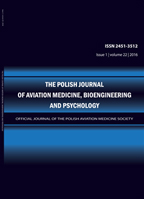2021, Volume 27, Issue 1
SENSATION SEEKING AND POSTTRAUMATIC STRESS LEVELS IN POLISH SOLDIERS FIGHTING IN AFGHANISTAN
MACIEJ ZBYSZEWSKI1, JAN TERELAK2
-------------------------------------------------------------------------------------------------
1Military Institute of Medicine
2Institute of Psychology, Cardinal Stefan Wyszynski University in Warsaw
Autor korenspondencyjny: MACIEJ ZBYSZEWSKI; Military Institute of Medicine; email: mzbyszewski@gmail.com
Full text
Streszczenie
Introduction: The central aim of the present study was to address whether sensation seeking traits are related to severity of posttraumatic stress disorder symptoms (PTSD) in soldiers conducting military operations in Afghanistan, and whether this effect is moderated by selected personality traits and strength of traumatic stimulus. The study was drawn upon the Regulatory Theory of Temperament by Strelau, in reference to which it can be assumed that people characterized by both the highest and the lowest levels of sensation seeking traits would be at greater risk of suffering from PTSD symptoms.
Methods: 125 Polish soldiers of the Armored Cavalry Brigade who took part in military mission in Afghanistan in 2013/2014 filled in the following psychological questionnaires: PTSD Questionnaire (PTSD – C Scale); Impact of Event Scale (IES); Sensation Seeking Scale (SSS – V); Impulsiveness Questionnaire (IVE); Eysenck Personality Questionnaire Revised (EPQ-R); Combat Exposure Scale (CES).
Results: Results indicated no direct relationship between sensation seeking and the severity of posttraumatic stress among Polish soldiers participating in combat operations in Afghanistan. However, after controlling for the effect of neuroticism and impulsiveness in the studied group of soldiers, the sensation seeking appeared to be a strong predictor of PTSD symptoms.
Conclusion: The study provided information on the feature of sensation seeking which regardless of its severity should not be treated as a predictor of emotional disturbances. However under certain conditions created by personality variables the relationship between the sensation seeking and symptoms of posttraumatic stress can occur. Possible explanatory mechanisms refer to the urge to immediate reduction the emotional tension. Among the personality types, individuals with high anxiety and high impulsivity would be most susceptible to the consequences of traumatic stress.
Słowa kluczowe
sensation seeking, PTSD, impulsivity, individual differences
